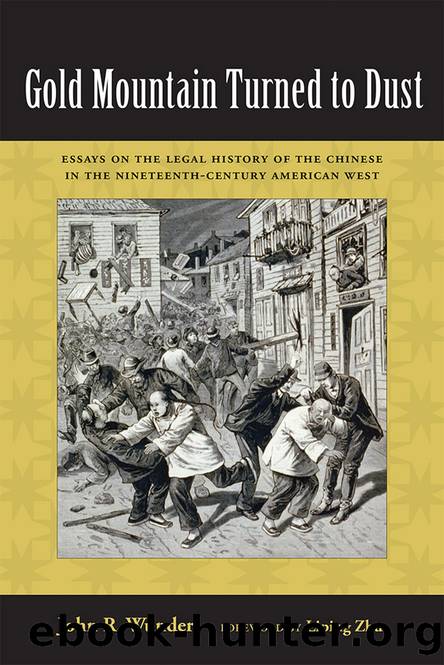Gold Mountain Turned to Dust by John R. Wunder

Author:John R. Wunder
Language: eng
Format: epub
Publisher: University of New Mexico Press
Published: 2018-10-15T00:00:00+00:00
CHAPTER 5
Chinese Laundries and the Fourteenth Amendment
Yick Wo v. Hopkins, 118 US 356 (1886)
In the summer of 1885, Yick Wo and over 150 other Chinese residents of San Francisco deliberately violated two ordinances in order to challenge an infringement on what they considered a basic right: the right to engage in economic activity. The San Francisco county and city ordinances, passed in May and July 1880, placed restrictions on laundry operators that were applied to prevent Chinese laundries from functioning. This challenge eventually was resolved by the US Supreme Court in a unanimous decision, Yick Wo v. Hopkins.
The period from 1820 to 1882 was a time of free Chinese immigration, and hundreds of Chinese moved to California. By 1870 over forty-nine thousand Chinese lived in California, and that number increased to over seventy-five thousand by 1880. This amounted to nearly 10 percent of Californiaâs population. Approximately 40 percent of all Chinese in California lived in the six counties of the San Francisco Bay area.
Many Caucasian and Hispanic Californians did not like this influx of Chinese. As a result, laws were passed that discriminated against them. The first California anti-Chinese law passed was the Foreign Minerâs License Tax Act of 1852, which required a head tax of four dollars per month to mine. In 1860 a Foreign Fishing License Tax Act of four dollars per month was passed, and two years later the Chinese police tax charged those not engaged in mining with a monthly $2.50 fee.
The legal assault on Chinese living in San Francisco became especially acute in the 1870s. The city and county passed such ordinances as the âQueue Ordinanceâ of 1876, which required the hair of Chinese prisoners to be cut, and the âNo Special Police for Chinese Quarter Ordinanceâ of 1878, which singled out the Chinese to deny them police protection for their homes and businesses. Also, an 1876 ordinance required all hand laundries with horse-drawn delivery vehicles to pay a new license fee of $2.25 per month.
Outright banning of the Chinese from certain economic activities also started in the 1870s. In 1879 Chinese were prohibited from working for state, county, or city governments. This provision was placed in the new California Constitution. The next year the California legislature made it a misdemeanor for any corporation chartered in California to employ Chinese workers. Thus these state laws and local ordinances made life extremely difficult for the Chinese in California. One historian concluded that âso severe and strident were the local laws that sought to banish the Chinese people from American life that in some ways they equaled the slave ordinances of the South.â
Anti-Chinese feeling manifested itself nationally in 1876 when a committee of California legislators memorialized Congress to restrict Chinese immigration. Six years later, Congress successfully passed the first of several exclusion acts aimed at halting Chinese from coming to the United States. These laws were enforced, and Chinese immigration was significantly curtailed.
Simultaneously, political agitation and violence struck California. In 1877 Denis Kearney led the Workingmenâs Party in protests against the Chinese in San Francisco.
Download
This site does not store any files on its server. We only index and link to content provided by other sites. Please contact the content providers to delete copyright contents if any and email us, we'll remove relevant links or contents immediately.
| Americas | African Americans |
| Civil War | Colonial Period |
| Immigrants | Revolution & Founding |
| State & Local |
In Cold Blood by Truman Capote(3366)
The Innovators: How a Group of Hackers, Geniuses, and Geeks Created the Digital Revolution by Walter Isaacson(3111)
Steve Jobs by Walter Isaacson(2879)
All the President's Men by Carl Bernstein & Bob Woodward(2357)
Lonely Planet New York City by Lonely Planet(2204)
And the Band Played On by Randy Shilts(2180)
The Room Where It Happened by John Bolton;(2141)
The Poisoner's Handbook by Deborah Blum(2123)
The Innovators by Walter Isaacson(2088)
The Murder of Marilyn Monroe by Jay Margolis(2085)
Lincoln by David Herbert Donald(1977)
A Colony in a Nation by Chris Hayes(1912)
Being George Washington by Beck Glenn(1872)
Under the Banner of Heaven: A Story of Violent Faith by Jon Krakauer(1784)
Amelia Earhart by Doris L. Rich(1680)
The Unsettlers by Mark Sundeen(1675)
Dirt by Bill Buford(1661)
Birdmen by Lawrence Goldstone(1652)
Zeitoun by Dave Eggers(1630)
